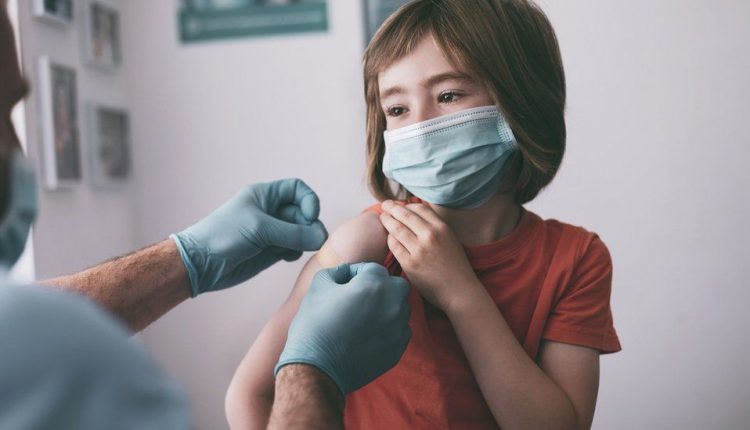Covid vaccine recommended for vulnerable five to 11-year-olds
Vulnerable primary school children should be offered a low-dose Covid vaccine, government vaccine advisers have said.
Some older children should also be offered a booster in response to the Omicron variant, they have said.
A low-dose version of a Covid vaccine for five to 11-year-olds has just been approved for use in the UK after being deemed safe and effective.
But a decision on vaccinating all five to 11-year-olds has not yet been made.
The recommendations by the scientific experts have to be officially approved by ministers in England, Scotland, Wales and Northern Ireland – but this is normally a formality.
It is not clear when children will actually get these vaccine doses. The priority for the NHS is expected to remain on giving adults their third or booster dose in the face of the Omicron wave.
“For children and young people who have completed a primary course of vaccination,
a booster dose will provide added protection against the Omicron variant.”
Junior-dose
The low-dose vaccine by Pfizer-BioNTech contains one-third of the adult dose and immunisations should be given eight weeks apart. It is widely used in other countries and more than five million children have been given it in the US alone.
The drugs regulator – the Medicines and Healthcare products Regulatory Agency (MHRA) – has licensed the vaccine for use.
Dr June Raine, chief executive of the MHRA, said: “Parents and carers can be reassured that no new vaccine for children would have been approved unless the expected standards of safety, quality and effectiveness have been met.”
She said the overwhelming majority of side effects were mild, such as a sore arm or a flu-like illness.
- Will schools be open in January?
- Covid isolation cut from 10 days to seven with tests
- New Covid rules trigger wave of cancellations
The government’s vaccine experts, the Joint Committee on Vaccination and Immunisation, then decided who would get it.
It said the vaccine should be limited, for now, to those who are clinically vulnerable due to conditions such as severe neuro-disability, heart and lung diseases and cancer. About 330,000 children would be eligible. Children who live with clinically vulnerable adults will also be offered it.
It is thought that 113 visits to paediatric intensive care would be prevented for every million vulnerable young children immunised.
However, only two admissions to intensive care would be prevented for every million healthy children given the same vaccine.
A decision on a wider roll out will be made in the New Year. Children are less severely affected by the virus and the UK only decided to immunise healthy children aged over 12 to help keep schools open.
The JCVI also recommended the normal booster dose should be offered to:
- Children aged aged 16 and 17
- Children aged 12 to 15 if they are in an at-risk group or live with someone who is immunosuppressed
- Children aged 12 to 15 who have a severely weakened immune system, who should get four doses.
Prof Wei Shen Lim, from the JCVI said: “Some five to 11 year olds have underlying health conditions that put them at higher risk, and we advise these children to be vaccinated in the first instance.
“For children and young people who have completed a primary course of vaccination, a booster dose will provide added protection against the Omicron variant.”
In other developments on Wednesday:
- A further 106,122 positive tests have been recorded in the UK – the first time the daily figure has gone above 100,000 during the pandemic
- The Welsh government will introduce stricter Covid rules from Boxing Day, with groups of no more than six people allowed to meet in pubs and restaurants
- Nightclubs in Northern Ireland will have to close on 27 December, the BBC understands, with other restrictions awaiting approval from ministers
- Self-isolation for people with Covid in England will be reduced to one week, if they test negative on days six and seven
- A record number of boosters and third doses were reported in the UK on Tuesday, with more than 30.8 million delivered in the UK – 6.1 million of which were in the past seven days alone
- Many European countries are reinstating their own restrictions in response to the spread of the Omicron variant continuing across the continent.


Comments are closed.